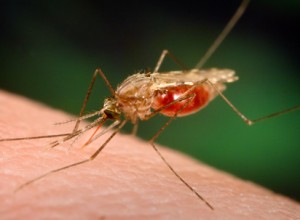Malaria on the increase in Western Region – Survey
 Dr. Gloria Quansah-Asare, Deputy Director-General of the Ghana Health Service (GHS), has disclosed that according to the 2014 Ghana Demographic Health Survey (GDHS), Western Region is one of the three regions of the country with the highest prevalence of parasitemia.
Dr. Gloria Quansah-Asare, Deputy Director-General of the Ghana Health Service (GHS), has disclosed that according to the 2014 Ghana Demographic Health Survey (GDHS), Western Region is one of the three regions of the country with the highest prevalence of parasitemia.
This means that 36 out of 100 children under five years had the malaria parasite in their blood, she said.
Dr.Quansah-Asare was speaking at this year’s celebration of the World Malaria Day in Takoradi under the theme: “Invest in the future: Defeat Malaria. ”
She advised the public to use available preventive interventions for malaria, such as Insecticide Treated Nets (ITN) and Intermittent Preventive Treatment for pregnant women.
Dr. Quansah-Asare said one of the reasons for commemorating the day in the Western Region was the Mass Long Lasting Insecticidal Bed Nets (LLIN) Point distribution, to take place in the region in May this year.
She again advised the public to sleep in the nets every night to curtail malaria transmission.
Dr. Quansah-Asare said routine health facility data in 2014 showed that deaths due to malaria reduced by 35 per cent from 3,256 in 2011 to 2,200 in 2014, and malaria case fatality rate in under five children was 0 point 51 per cent as compared to 14 per cent some years back.
She said the 2014 GDHS also put ownership of insecticide treated bed nets in Ghana at 68 per cent, an increase over the 2003 GDHS figure of 18 per cent.
Dr. Quansah-Asare said Ghana must accelerate the campaign against malaria in line with Millennium Development Goal (MDG) Six, and to ensure attainment of MDGs Four and Five, more resources needed to be put into malaria control.
She called on the people to support the effort to establish a Malaria Fund to help increase financial resources for malaria control, and to help meet obligations for counterpart financing of malaria interventions.
Dr. Quansah-Asare asked corporate organizations to allocate financial resources for the country to embark on accelerated control to eliminate malaria, as outlined in the National Strategic Plan for malaria control in Ghana.
Dr. Keziah Malm, Acting Programme Manager of the National Malaria Control Programme (NMCP), said the programme was to introduce a new malaria intervention in all districts of the Upper West Region.
She said the intervention had been designed specifically for the region to reduce malaria infections.
Dr. Malm was not happy that malaria in the Western Region had increased, saying in the past, the Upper West, Upper East and the Northern Regions, had high incidence of the disease.
She said galamsey activities in the region had left big holes which had become the breeding places for mosquitoes, adding that galamsey operators must use the right processes in order not to create more breeding sites for mosquitoes.
Dr. Malm advised the public to cover all holes near their homes, to prevent mosquitoes from breeding when it rained.
She said prompt and effective treatment was necessary in controlling malaria, and reducing deaths resulting from the disease.
Dr. Malm said all cases must be subjected to diagnostic test before treatment, adding that fever was sometimes taken for malaria, but the two were different ailments.
Dr. Salia Ohene, World Health Organization (WHO) Representative in Ghana, who spoke on behalf of development partners, said Malaria could be prevented or controlled through the use of LLINs, and called for massive participation in LLINs Point Distribution in the Western Region.
She said increased malaria funding was needed in order to save lives, and further expand access to malaria prevention, diagnosis and treatment services in the country.
Dr. Ohene said more funds were urgently required to make effective tools already in existence available to address emerging issues, such as drug and insecticide resistance.
She said there was a global consensus to reduce malaria mortality and incidence rates by at least 90 per cent by 2030 and eliminate malaria.
“We the partners of Ghana on our part will continue to provide financial support and evidence-based guidance to all countries and stakeholders to better target malaria interventions, strengthen national health systems towards universal health coverage and accelerate progress towards a malaria-free Africa”, Dr. Ohene said.
Mr. Alfred Ekow Gyan, Deputy Western Regional Minister, said deaths due to malaria among pregnant women and children had reduced drastically as a result of the adaption of a multi-pronged strategy which includes Insecticide Treated Nets (ITNs), indoor residual spraying, compliance and adherence to the treatment of malaria as well as frequent public education and creation of awareness on public health issues.
Osagyefo (Dr) Kwamena Annimil VI, President of the Western Regional House of Chiefs and Omanhene of Wassa Fiase Traditional Area who presided, pledged the support of the Regional House of Chiefs and his traditional area for the country’s malaria programme.
Source: GNA
